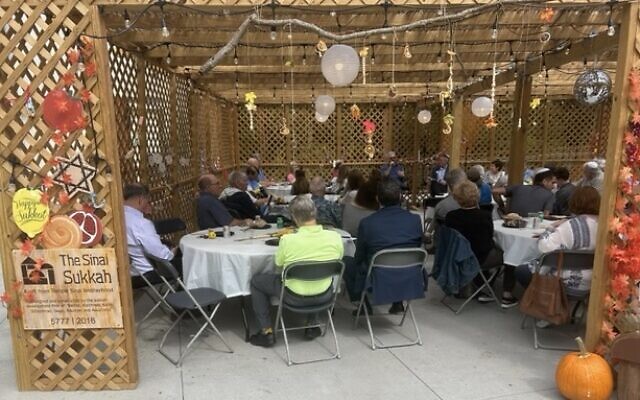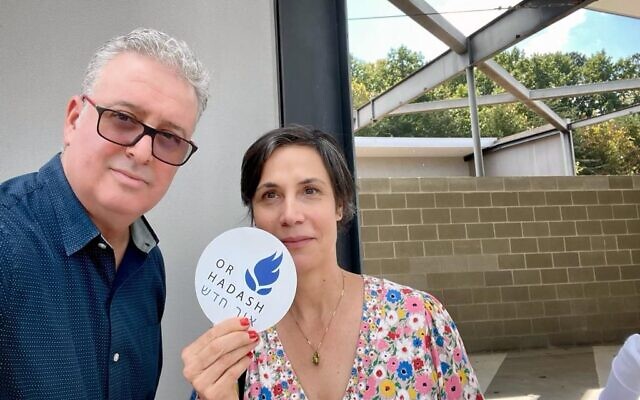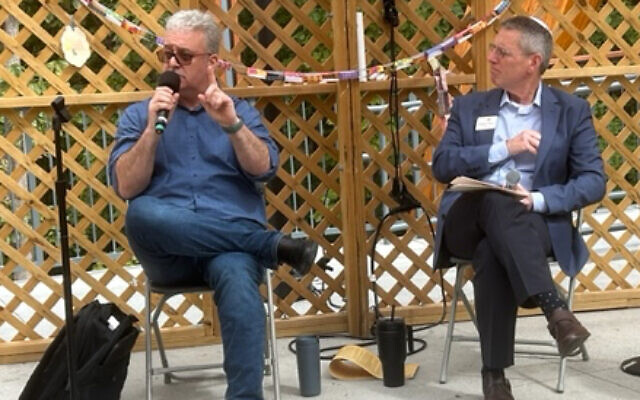Israeli Pro-Democracy Sukkah Brings out Hundreds
The unique program was held at nine different congregations around Atlanta.
Starting with Yom Kippur and continuing through Sukkot, hundreds of Atlanta Jews attended programs at their synagogues led by local Israeli ex-pat protest leaders.
“They got to hear from us about our fears and concerns and why this is different from anything done before,” said Dotan Hapak, who orchestrated the Atlanta Israeli Democracy Sukkot program. He was referring to the nearly 10-month consistent show of dissension in Israeli streets against the proposals and direction of the Israeli government which they say is weakening Israel’s democracy.
About 10 Israelis now living in Atlanta led the various programs held at nine local congregations. They were chosen, Harpak explained, to denote the various political perspectives represented by the larger Israeli ex-pat community that has been protesting in Atlanta for months. Harpak spoke at The Temple, Ahavath Achim Synagogue, and Temple Beth Tikvah.
Yael Manes, an associate professor of history at Agnes Scott College, who has lived in Atlanta since 2011, volunteered to speak at the programs at Congregation Or Hadash and at The Temple.

“It felt desperate for me to do what I can here thousands of miles away from Israel,” she said, referring to the outreach of Israelis to the American Jewish community. Her family in Israel – including an 81-year-old uncle who received a top award for his actions as a tank commander of the Golan Heights during the Yom Kippur War in 1973 – have been protesting against the current government and its agenda.
Although she is used to public speaking, Manes said she was nervous before the Or Hadash program on Sept. 30, attended by about 40 people, including children, after the Shabbat kiddush in the Sukkah. “I didn’t know what to expect. I felt responsible for presenting what’s a very important movement and I didn’t want to push people away. I’m not an activist. This is the first time I’ve been involved in activism.”
Like most of the synagogue programs, the Israeli leaders – in Q & As with the congregational rabbis – were greeted with more curiosity and interest rather than skepticism. Rabbi Ari Kaiman of Congregation Shearith Israel said the only “antagonistic questions” at his Oct. 3 Sukkot program came at the end.
A capacity crowd of about 65 people, mostly seniors, attended the Oct. 6 program at Temple Sinai. Interviewed by Senior Rabbi Ron Segal was Amit Mayer, who has been in Atlanta for about 10 years and works for an international healthcare company. Like Manes – with whom he spoke at Or Hadash a week earlier – he had never been a political activist until he became aware of what the government of Prime Minister Benjamin Netanyahu was proposing in Israel.

“We have a coalition in Israel that is actively pursuing laws that would take away each and every mechanism that can keep it in check, that can balance the power that they have, that could limit the power that they have, that could regulate what they can and can’t do,” he said. Mayer pointed out that the government isn’t trying to hide its intentions.
“They clearly state that they have plans that are very, very extreme, whether those are on the political scale or the religious scale or whatever it is,” he said. “They have plans that would never exist, would never be allowed in a country where there are checks and balances on the power of the government. They want to take those checks away so that they can do…whatever they want. And if that happens, then Israel stops being a democracy and becomes something else, something that is really hard to imagine.”
The question of whether and how American Jews can support the pro-democracy movement in Israel was raised time and time again. Mayer noted that “all of those things that Israel has represented throughout these 75 years have been a source of pride and protection, a shield for us as Israelis and as Jews worldwide. If that goes away, if Israel becomes similar to what our enemies or adversaries say that Israel is, then that chain goes away. That source of pride would be eroded.”
They have plans that would never exist, would never be allowed in a country where there are checks and balances on the power of the government. They want to take those checks away so that they can do…whatever they want. And if that happens, then Israel stops being a democracy and becomes something else, something that is really hard to imagine.
Harpak said, in general, the Israeli ex-pats encountered “shock and disbelief about some of the facts and acts of this government and its agenda,” as well as about some of the members of the coalition government. “Everywhere I spoke there were honest questions,” he said of his interlocutors. “The conversations were very thoughtful, open and productive.”
“It was affirming for me,” Harpak added. “There was a thirst for knowledge about what has been happening in Israel.”
The learning, however, didn’t flow just from the Israeli speakers to the various synagogue congregants. Manes said she “felt like I got to know the metro Jewish community through this program. It was a really deep conversation. The people were very interested in what’s going on and what they can do. We all felt that.”
She also emphasized that the pro-democracy protests both in Israel and in Atlanta are “not against Israel. It’s against the Israel the government wants to turn it into. I’m protesting for the safety of Israel and the ideals that sustain it.”
As far as any follow-up to the unique program that hadn’t been tried in any other U.S. Jewish community, Harpak said his group will stay in touch with the synagogues. He also recommended that those interested go to the Atlanta for Israel Democracy Facebook page.
- Sukkot
- Community
- Jan Jaben-Eilon
- Bob Bahr
- Yom Kippur
- Dotan Hapak
- Atlanta Israeli Democracy
- The Temple
- Ahavath Achim Synagogue
- temple beth tikvah
- Yael Manes
- Agnes Scott College
- Congregation Or Hadash
- Golan Heights
- Rabbi Ari Kaiman
- Congregation Shearith Israel
- Temple Sinai
- Senior Rabbi Ron Segal
- Amit Mayer
- Prime Minister Benjamin Netanyahu




comments